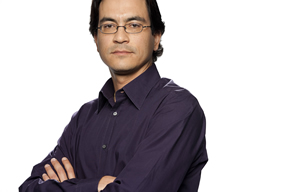 Scholars and First Nations leaders are heralding a new course at the University of British Columbia’s Graduate School of Journalism as a “groundbreaking” initiative in journalism education that promises to build stronger relationships between media and Aboriginal peoples in British Columbia.
Scholars and First Nations leaders are heralding a new course at the University of British Columbia’s Graduate School of Journalism as a “groundbreaking” initiative in journalism education that promises to build stronger relationships between media and Aboriginal peoples in British Columbia.
Duncan McCue, an award-winning CBC-TV journalist, will teach the innovative course, called Reporting in Indigenous Communities (“RIIC”).
“The goal is to improve media coverage of Aboriginal communities,” explains McCue, one of the few First Nation mainstream media reporters in Vancouver.
“We want to expose the next generation of journalists to Aboriginal stories, cultures and protocols, in a safe environment, before they wind up in big newsrooms facing unrelenting deadlines.”
UBC journalism students will be taught about First Nations’ ethics, histories, and politics, and will immerse themselves in several different indigenous communities in BC’s Lower Mainland. Their research will ultimately lead to a series of news stories in print, audio-visual and web formats.
“Reporters aren’t immune to the stereotypes about Aboriginal people that exist in the Canadian public; journalistic biases are well-documented,” says McCue. “We aim to change that, through experiential learning.”
Several Aboriginal communities and organizations, such as the Squamish Nation, Tsleil-Waututh First Nation, Tsawwassen First Nation, Sto:lo Tribal Council, and the Metro Vancouver Aboriginal Executive Council, agreed to partner with UBC, offering access to their communities and guest lecturers.
“We believe this type of course is sorely needed in Canadian journalism schools,” wrote Kim Baird, chief of the Tsawwassen First Nation, in a letter of support, “to improve the relationship between media and Aboriginal peoples in BC, and the quality of journalism about Aboriginal issues in Canada.”
UBC is the only journalism school in Canada with a course devoted to studying Aboriginal representation in journalism. It is part of the school’s ongoing efforts to enhance diversity in the media.
“The course Reporting in Indigenous Communities is ground-breaking, and unprecedented in curriculum design,” says Dr. Minelle Mahtani, a member of UBC Journalism School’s Advisory Committee, as well as an Associate Professor in the Program in Journalism at the University of Toronto.
“It demonstrates UBC Journalism School’s ongoing commitment to ethical, responsible and equitable coverage of marginalized groups in journalism.”
Peter Klein, the acting director of the UBC Graduate School of Journalism, hopes the course will encourage more Aboriginal students to apply to journalism school.
“The lack of Aboriginal mainstream reporters is a concern to all schools of journalism across Canada,” says Klein. “We want our curriculum at UBC to encourage Aboriginal peoples to consider reporting as a career.”
McCue designed the curriculum for the course while on a Knight Fellowship at Stanford University in California, where he also developed an online educational guide to assist reporters who cover indigenous communities.
“If we give journalists opportunities to learn about indigenous communities – whether online or in a classroom – our audiences will be the ones who benefit,” says McCue
Classes in the inaugural RIIC course begin in the spring term (January 2012).
RIIC-INDIGENOUS COMMUNITY PARTNERS
• Squamish Nation;
• Tsleil-Waututh First Nation;
• Tsawwassen First Nation;
• Sto:lo Tribal Council; and
• the Metro Vancouver Aboriginal Executive Council.
FOR MORE INFORMATION, CONTACT:
Peter Klein, Acting Director, UBC Graduate School of Journalism
phone: 604-822-6688
email: peter.klein@ubc.ca
Duncan McCue, CBC News
email: duncan.mccue@cbc.ca
twitter: @duncanmccue
skype: duncan.mccue